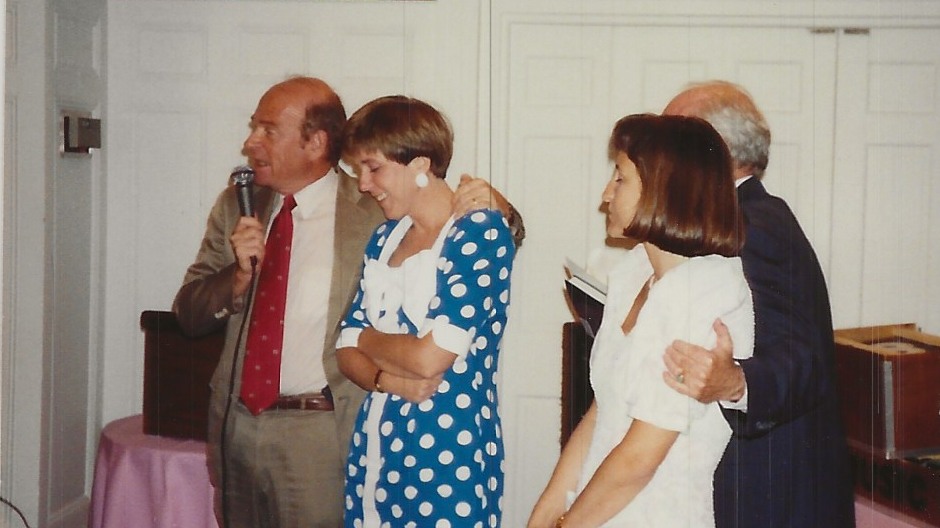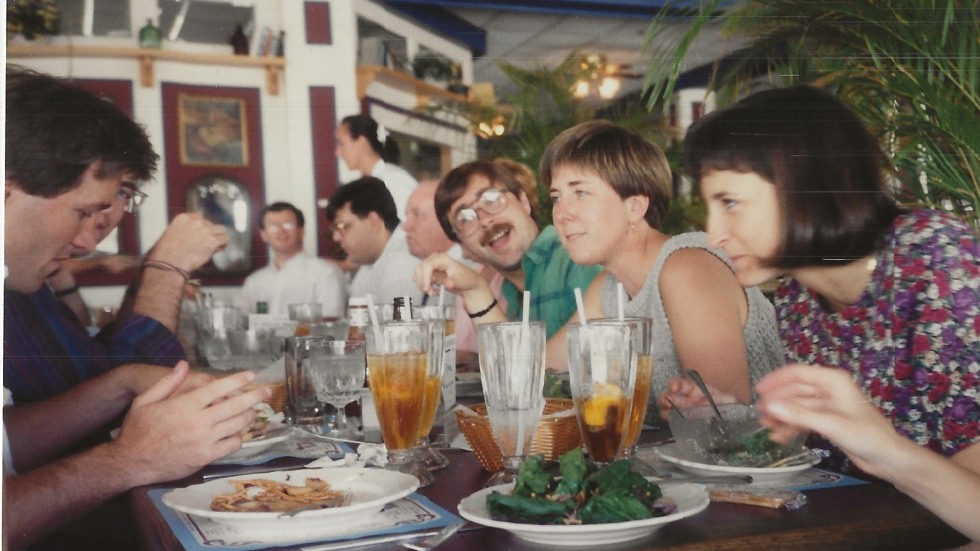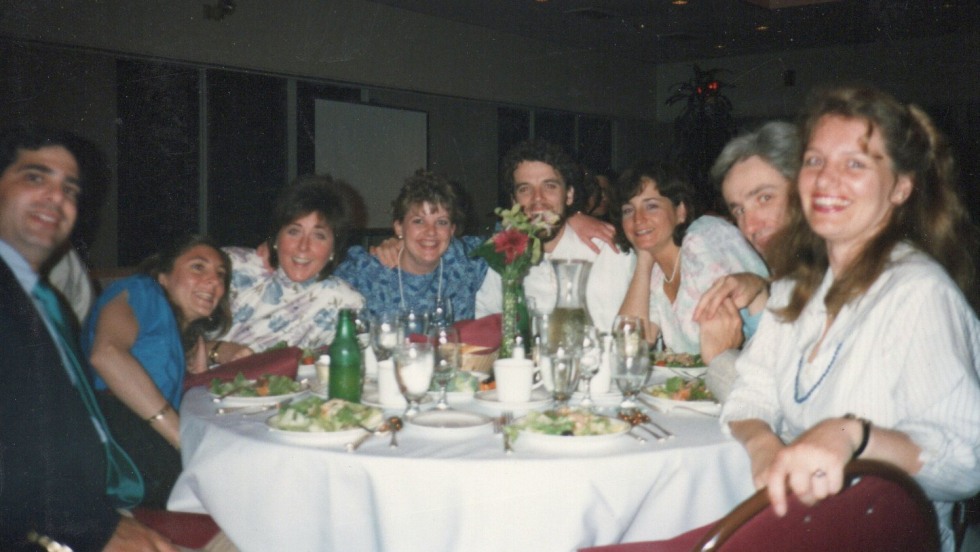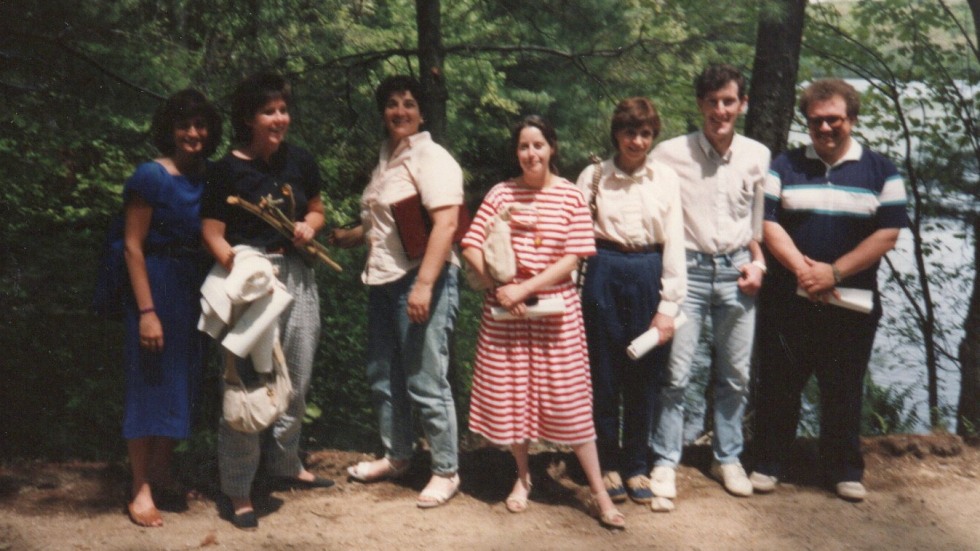Child and Adolescent Psychiatry: Reflections from the First Triple Boarders
Child and Adolescent Psychiatry: Reflections from the First Triple Boarders

Sandra “Sandy” Fritsch, M.D., and Carolyn Federman, M.D., share a unique bond. Not only were they the only trainees in Brown’s first Triple Board Residency class, but they were also two of 12 inaugural Triple Board trainees nationwide. Fritsch and Federman graduated from the residency in 1991 and took divergent career paths. Federman is now in private practice as a child and adolescent psychiatrist in the northwest suburbs of Chicago. Fritsch is medical director of the Pediatric Mental Health Institute at Children’s Hospital Colorado and a professor of psychiatry at the University of Colorado Anschutz. She has written a perspective piece about her time in the program, Memoirs of a Triple Board Pioneer, for Academic Psychiatry.
Taking the Leap into a New Program
Sandy: I went to medical school at Michigan State and there was a psychiatrist there, Norbert Enzer, who actually was part of the planning for the triple board programs. He educated me about the plans, but also I liked the idea of having options in pediatrics as well as psychiatry. When you’re not quite sure what to do with your life, having options is very appealing.
When I came to visit Brown, they put me up in the Duncan Lodge, this beautiful, historic building on the Butler [Hospital] campus. Then I met Tom [Anders]. He was really a visionary. He’d brought all these people from Stanford to Brown and I knew it was a wonderful chance to train here.
Carolyn: For a while, I was debating between medicine or teaching. I initially wanted to be an educator. I headed the medical route because my goal has always been that a healthy body and healthy mind would make it easier for kids to learn. I liked the idea of having a heavier pediatric background.
We had a lot of recognition and support by being the first [triple boarders]. We were referred all these great cases from all three domains. It felt like we were representing the program and had to show that the program was worthwhile.
Building the Plane While Flying
Sandy: The first two years, we had the exact same experience as the pediatric classes did, which meant we did a tremendous amount of NICU and PICU rotations. We didn’t have an opportunity for electives. One of our recommendations was that that needed some changing.
Our fourth year, they had us doing everything [all three domains] combined at Rhode Island Hospital. The idea was that if you saw a patient on the consult service and they needed to be admitted, you would follow them there. That happened with a patient of mine – and I’m well-organized, I can take on a lot – but I had to say, “It’s too much. I can’t do it.” That was a really hard thing for me to do. Later that afternoon, I was working in outpatient child psychiatry at the Potter Building and was saying goodbye to Larry Brown. Larry said, “I’ll see you tomorrow.” I said, “I don’t know. I might be fired because I refused this case.” He goes, “Wait, whoa, what are you talking about?” They ended up really modifying the schedule to put more structure in place for us.
A Memento from Pediatrics
An identity and a keepsake
An Unforgettable Clinic
Carolyn: The encopresis clinic at Rhode Island Hospital was a very cool experience that really pulled the psych and peds stuff together in our training. Lori Stark was the big person there. They had this wonderful two-part program – one whole piece for the kids, one whole piece for the parents. There was this red book with amazing diagrams, diet information, foods. I still use it to this day, and everything I learned in that clinic I use in my practice now.
Sandy: I did more rectal exams on these kids as a child psychiatrist than I did as a pediatrician because of that encopresis group. I remember the playroom had a high chair in it for feeding cases and there was something called bug-in-the-ear, where the psychologist or therapist would be prompting the parents what to do, when to ignore something, when to respond. For kids, the encopresis group was something the only time they met another kid that had a poop problem. It was really powerful.
Relevance in Private Practice
From diabetes to neuro
A Life-Saving, Lifelong Friendship
Sandy: If either one of us had dropped out of the program, the other would have, too. Because supporting one another was so, so important. We made it through the program because of one another. There’s no doubt in my mind.
Carolyn: Our friendship was a given. We were in this together. For those five years, we were going to be partners in this completely new thing. It’s still the kind of friendship where you can pick up right where you left off. We have kids who are similar ages and whenever we were in the same area, we would get together. Even as recently as 2023, we dropped by her house in Colorado on our way to go skiing. I’ll call if there are things I don’t know or if either of us has a life question.
I was a better pediatrician for my adult psychiatry training because I understood parents. I think that’s still missing in pediatrics to this day.

Sandra Fritsch in blue dress, Carolyn Federman in white dress, at their graduation party in the summer of 1991. Faculty member Tom Anders is in the red tie.

Child and adolescent psychiatry fellows and triple board residents share a meal.

A gathering of pediatrics residents.

A retreat for Bradley Hospital child psychiatry personnel.
When Training Comes Full Circle
Carolyn: I remember a psychiatrist who led rounds at Bradley Hospital. He had a way of giving one line of information that would tie everything together – what had happened the day before, what was needed for the day. It was just so clever. I aspired to be like that. Now, in my 20-25 appointments with my patients, I get to throw out some of those one-liners. Just to get things more solidified in the kid’s life or the parent-child interactions.
Sandy: In our third year of training, we went to our first annual meeting of the American Academy of Child and Adolescent Psychiatry. One of the things I went to was the Simon Wile Symposium on the interface of pediatrics, child psychiatry, consultation, and things like that. Every year, there’s a Simone Wile award winner and I thought, “Wow, that’s really cool. When I grow up, I want that to happen.” And it’s actually happening this year. I’ll be giving a talk about what child psychiatrists need to know about pediatrics. There’s been this huge focus lately on making sure that pediatrics has mental health competencies, but it’s got to be bi-drectional.
Celebrate 50 Years of Training
See more reflections and history from 50 years of training at Brown Psychiatry and Human Behavior.